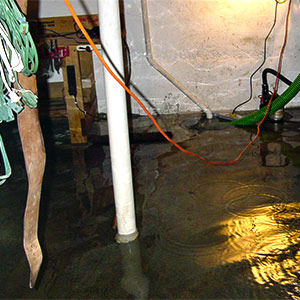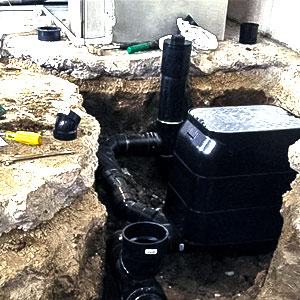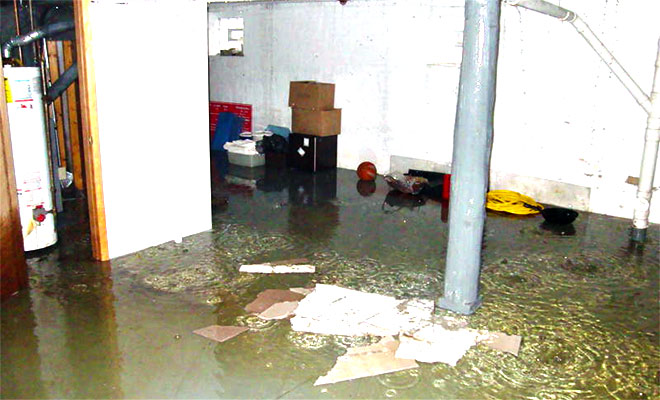There is no good time for a flooded basement. When you first see the water, it might feel a little overwhelming. The problem can be such a shock that some homeowners don’t even know where to start. If you have a basement, it does not matter whether you have experienced flooding in the past or not, you need to know what to do if your basement floods.
If you head down the stairs only to find the basement flooded, you want to act fast, but you also want to act with purpose. Some things may need to be taken care of immediately, and you want to make sure to follow certain steps to protect your home against further damage.
Safety First

If you are going to address the problem, you are going to have to go into the basement. Before you go down there, you need to make sure that it is safe. A flooded basement could be a hazard to your health, and it could even pose the risk of death. At the very least, wear some heavy-duty rubber boots as a safety precaution if you plan on entering the water.
The first thing that you want to consider is the potential risk of electrical shock. Even if there is only a few inches of water, there could be an electrical cord in the water, and this could be a hazard. If you are certain there is no risk, go to your electrical panel and make sure that all of the basement circuits are turned off.
If the water is higher, the risk of electrical shock could be even greater. If the panel is in the basement or the water is high enough to reach the outlets, submerge baseboard heaters, the furnace, or any other electrical appliance you will need to get the basement pumped before you can do any work down there. Contact your local electrical utility and request their help to disconnect your power, for detail information please view the flood safety information provided by the Electrical Safety Authority.
As a final point on safety, you might want to consider whether there are any harmful contaminants in the water. Depending on the source of the flooding, it could contain sewage or dangerous chemicals. If the water is high enough to where it is going to come into contact with your skin, this could be a serious concern.
Identify the Source
When the basement floods, or is in the process of flooding, you want to try to identify the source of the water. If you catch the flooding early, finding the source and a way to stop it could make a significant difference in regard to the amount of damage that your property will sustain.
A basement could flood for a number of different reasons, and not all of them will be something that you can stop right away. It could be a burst pipe, a clogged drain, a malfunctioning sump pump, surface flooding that has found its way into the basement or it could be a leak in the foundation.
Document the Damage

Recovering from a flood can be expensive, but your homeowner’s insurance might be able to help you cover some of the costs. If you want to ensure the best possibility that your claim will be acted upon, and that all of the damage will be covered, you need to provide documentation and evidence.
When you are investigating the flood and its cause, you should take pictures of all of the damage. In addition to that, take notes and document the source. All of this evidence could be important when a representative of the insurance company comes around to assess your claim.
The cause of the flood may also be important for the purposes of your insurance claim. Depending on the scope of your policy, it may or may not cover flood damage that was the result of certain types of natural events. When you have the time, you may want to review the policy to make sure that you are covered.
Assess the Damage and Clean-up
Once you have identified the cause of your basement flood, you can start planning your clean up and repairs. For damage that is covered by insurance, it is important to note that you may need to follow certain recommendations from your insurer and they might already have companies that they contract with for cleaning up flooded basements.
With some of the minor flooding issues, it might be a situation that you can handle on your own. If the damage is extensive, you might want to consider hiring a contractor that specializes in flood damage. You also need to consider the source of the water and the possible repairs that you may need.
Removing the water is going to be the first step toward getting things in order. For a small amount of water, you might be able to use a wet/dry vac. If the water is high, then you probably need to call in a professional.
When it comes to cleaning up after a flood, there is the significant value that comes with hiring a professional. Removing the water is one thing, but you also have to consider issues with mold and bacteria. A professional service will have the equipment and the knowhow to do the job right, and they can help to prevent problems that can arise from things like mold.
Prevention

After you have the basement cleaned up and back to normal, it is time to think about what can be done to prevent flooding in the future. If the insurance company covered the damage, they might make recommendations for ways to prevent the problem from reoccurring.
If you are on your own when it comes to repairing the flood damage, then you have some points to consider. If it was a leak in the foundation, then it is time to call a foundation repair specialist. If it was a plumbing problem, then you obviously need to get a plumber out there. If the problem was from heavy rainfall or snowmelt, then there could be several points that may help to prevent the water from getting in the basement.
The way that you respond to a flooded basement can make a significant difference in the amount of money that it will cost and to how disruptive the event is going to be to your life. You need to be smart and play things safe. Only hire a reputable Toronto basement waterproofing contractor for any work that you have done, and take the necessary steps to prevent basement floods in the future.

